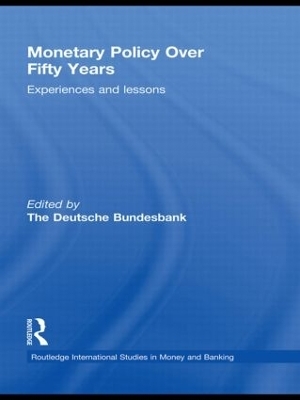
Monetary Policy Over Fifty Years
Routledge (Verlag)
978-0-415-47847-2 (ISBN)
This book is based on a conference celebrating the 50th anniversary of the Deutsche Bundesbank. Since the 1950s, there have been fundamental changes in the monetary order and financial systems, in our understanding of the effects of monetary policy, the best goals for central banks and the appropriate institutional setting of central banks. Prominent monetary economists and central bankers give their views on the most significant developments during this period and the lessons we should draw from them.
The book contains four sections on central issues. The first part discusses the main successes and failures of monetary policy since the 1950s. The second part asks what economists have learned about monetary policy over the past 50 years. It gives an overview on experiences with various monetary strategies, focusing in particular on monetary targeting and its problems, on inflation targeting and why it was successful and the institutional framework for monetary policy. The next section outlines the progress that monetary economists have made since the Bundesbank was founded and discusses the extent to which central banks can rely on "scientific" principles. The final part describes the interaction between monetary policy, fiscal policy and labour markets.
The book provides a comprehensive overview of the main challenges faced by central bankers in the past and how and to what extent monetary economics have been helpful in tackling them. It outlines our current knowledge about the effects of monetary policy and the appropriate institutional framework for central banks and raises some open questions for the future. It will be of great interest to monetary economists, central bankers and economic historians.
The Deutsche Bundesbank is Germany’s central bank. Since 1999, the Bundesbank has continued to perform important central bank functions as an integral part of the European System of Central Banks.
Introduction (Axel Weber, Deutsche Bundesbank) 1. What have economists learned over the past 50 years? (Lars Svensson, Princeton University & Sveriges Riksbank) [Comments: Takatoshi Ito (Professor, University of Tokio), Bennet McCallum (Professor, Carnegie Mellon University), Athanasios Orphanides (Governor, Central Bank of Cyprus)] 2. Success and failure of monetary policy since the 1950s (David Laidler, University of Western Ontarion) [Comments: Charles Goodhart (London School of Economics), Otmar Issing (Center for Financial Studies, Frankfurt), Don Kohn (Federal Reserve Board)] 3. Monetary policy and its environment: fiscal policy, labour and goods markets (Olivier Blanchard, MIT) [Comments: Wolfgang Franz (President, ZEW), Lars-Hendrik Roeller (European School of Economics and Technology), Hans-Werner Sinn (CESifo)] 4. Will monetary policy become more of a science? (Frederic Mishkin, Federal Reserve Board) [Comments: Richard Clarida (Columbia University), Manfred Neumann (Bonn University), Lucas Papademos (Eiropean Central Bank)]
| Erscheint lt. Verlag | 1.6.2009 |
|---|---|
| Reihe/Serie | Routledge International Studies in Money and Banking |
| Zusatzinfo | 9 Line drawings, black and white |
| Verlagsort | London |
| Sprache | englisch |
| Maße | 156 x 234 mm |
| Gewicht | 490 g |
| Themenwelt | Geschichte ► Teilgebiete der Geschichte ► Wirtschaftsgeschichte |
| Wirtschaft ► Volkswirtschaftslehre ► Finanzwissenschaft | |
| ISBN-10 | 0-415-47847-2 / 0415478472 |
| ISBN-13 | 978-0-415-47847-2 / 9780415478472 |
| Zustand | Neuware |
| Haben Sie eine Frage zum Produkt? |
aus dem Bereich


